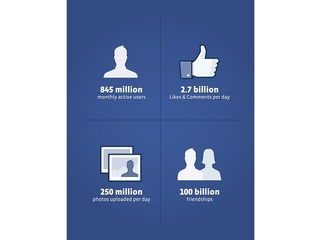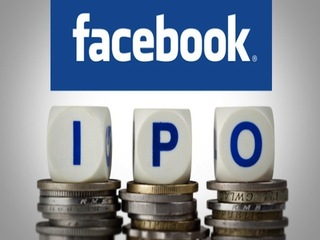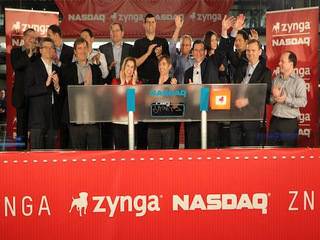Peter Thiel: 'Almost everybody (tech CEO) I know' shifted right
At Culture, Religion & Tech, take II in Miami on October 29, 2024
Read more...
At a time when the IPO market is rippling from the recent wave of high-flying technology companies like Zynga and LinkedIn, Facebook's eagerly anticipated initial public offering is by far the largest and most hyped yet. It hopes to raise $5 billion, more than any other U.S. tech company since Google.
And why not? Long before its plans to become a publicly-traded company, Facebook was a household name. The company, which got its start in a Harvard dorm room eight years ago, today has a staggering 845 million users worldwide, with more than half of its users logging on every day, according to company reports. Financially, this translated into $1 billion profit for the company last year.
With the hype leading up to the IPO filing, we’ve read about how Peter Thiel’s early investment of $500k is now worth in excess of $2 billion. LinkedIn founder Reid Hoffman reportedly invested $40,000 as an angel investor. His investment’s current worth? About $350 million. Even if these reports are a little inaccurate, the wealth creation for early investors, founders and employees alike is astounding.
Every investor dreams of getting in on the meteoric rise of a hot stock like Facebook. But even if they wanted to, few individual investors have had the opportunity to acquire Facebook stock in the private market. Now, that changes with Facebook’s IPO. So the question is: will Facebook turn out to be the next big thing for ordinary investors—or the next disappointing bust?
On the surface, investing in an enormously popular company like Facebook may seem like a sure bet, and the temptation is to join the gold rush by snapping up shares as the opening bell rings. But as the stock market has taught us over and over again, nothing is guaranteed and what happens next is anyone’s guess.
Seeing beyond the hype: Lessons Learned
After debuting last May, shares of LinkedIn skyrocketed 138% on their first day of trading, rising from $45 to $122. But over the course of a few days, the stock plunged to $60 before again rising to more than $100. Six months later, shares sunk to a new low of $55. The stock is now trading at around $79.
Zynga and Pandora both saw their stocks fall on debut. In fact, Zynga opened below its issue price of $10. The stock has now recovered and is trading in the $12 range.
In July 2011, Zillow opened on the NASDAQ with a whopping $60 share price, but fell quickly to $34. It’s currently trading at $31. No investor wants to be on the wrong side of timing these volatile swings.
While not always the case, many highly publicized stock market entrants have also underperformed over longer periods. Data compiled by Bloomberg reveals that, as a whole, all 333 IPOs that hit the market over the two-year period are collectively trading at a miserable minus 11 percent—actually losing money since their offering. And there's plenty of other evidence on poor IPO performance dating back to the late-80s.
An Alternative Way to Play
So, is there any way ordinary investors can potentially benefit from one of the biggest Internet IPOs? The answer is yes, but don’t think of it as a quick, big payday.
Many investors may already indirectly own a small piece of Facebook without having to acquire shares on the market. According to a recent MarketWatch article, roughly 50 mutual funds and ETFs own stakes in the social media company (as of the end of 2011, 19 funds managed by T. Rowe Price held over $400 million Class A shares of Facebook). More funds will pick up shares in the future.
These holdings are relatively small though, and shouldn’t be relied upon to suddenly boost performance of the funds in question.
Thinking Long Term
A better approach than seeking a quick gain is to focus on your long term investment goals. The dot-com bust and Great Recession have strengthened the case for sensible long-term investing like never before.
Diversification—not putting all your investment eggs in one basket—is essential to reduce overexposure to a single stock and to keep assets safe through bull and bear cycles. How an investor determines the right portfolio mix depends on individual objectives and appetite for risk as part of a sound investing plan, preferably for the long term.
In these uncertain times, it makes sense to evaluate Facebook (and any other IPOs, for that matter) within the context of your investment plan. Does your plan call for more exposure to the tech sector? Is your portfolio underweight in domestic growth stocks? Are there sound long-term fundamentals underlying the hype?
For prudent investors, these are the better questions to ask rather than wondering whether Facebook stock will rise or fall in the hours or days after IPO. That is akin to calling black or red on the roulette table.
Investing may be inherently risky, but it shouldn't be a speculative gamble, especially not if your financial future is at stake.
(Image source: kilroycafe.blogspot)

Co-founder and joint CEO of Jemstep, a Silicon Valley start-up that takes the complexity out of investing by using technology to evaluate and identify your best investment options.
All author postsAt Culture, Religion & Tech, take II in Miami on October 29, 2024
Read more...The company will use the funding to broaden the scope of its AI, including new administrative tasks
Read more...The company will be deploying Qventus’ Perioperative Solution to optimize its robotics program
Read more...Startup/Business
Joined Vator on
Jemstep Advisor Pro is an online client acquisition and servicing platform for financial advisors that helps them attract more clients, increase AUM and service their clients more efficiently. Includes paperless account opening, account aggregation and CRM integration.






